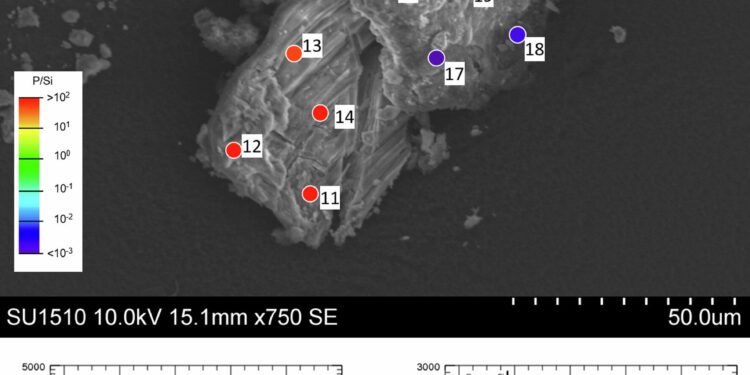SEM/EDS analyzes of the extracted particle A0218. Credit: Natural astronomy (2024). DOI: 10.1038/s41550-024-02366-w
An international team of researchers from a wide variety of backgrounds has found evidence that asteroids provide the compounds needed to start life on Earth. In their article published in the journal Natural astronomy, the group describes their study of a small sample of material collected from Ryugu and brought back to Earth.
In 2014, the Japanese space agency JAXA launched a rocket containing a space probe called Hayabusa2 that was sent to Ryugu, a C-type asteroid that has roughly the same orbit around the sun as Earth. Once it reached its target, the probe collected surface samples as well as collision dust samples, both returned to Earth in 2020.
Since then, the samples collected by the probe have been studied by numerous teams seeking to learn different things about the asteroid and its history. In this new study, the research team examined a collision sample from Ryugu for evidence of asteroids as a source of many compounds necessary for life on Earth.
The researchers’ work involved placing grains of Ryugu material in a sealed chamber designed and built by the group, which allowed a spectral microscope to be used in a vacuum-sealed environment. The samples were placed on sapphire dishes to allow them to be studied using wavelengths beyond the visible spectrum. The dishes were placed on polished mirrors coated with gold to prevent contamination.
Using X-ray spectrometry and other inspection tools, the researchers found examples of hydrated magnesium, ammonium and phosphorus. The results show that asteroids such as Ryugu are made not only of organic elements and compounds, but also of compounds in their hydrated form, which could have served as the building blocks of life on Earth.
Such a discovery, the researchers note, shows that the grains in which they were contained came from deep space, beyond Jupiter. If they had formed closer to the sun, they would have evaporated. The research team also notes that the discovery of ammonium is particularly important because its molecule can contribute both hydrogen and nitrogen when it breaks down.
More information:
C. Pilorget et al, Phosphorus-rich grains in Ryugu samples with major biochemical potential, Natural astronomy (2024). DOI: 10.1038/s41550-024-02366-w
© 2024 Science X Network
Quote: Analyzes of Ryugu samples show asteroids may have delivered compounds needed for the start of life on Earth (October 8, 2024) retrieved October 8, 2024 from
This document is subject to copyright. Except for fair use for private study or research purposes, no part may be reproduced without written permission. The content is provided for informational purposes only.



